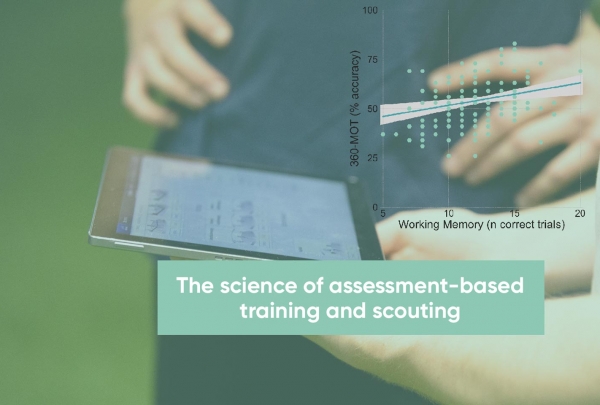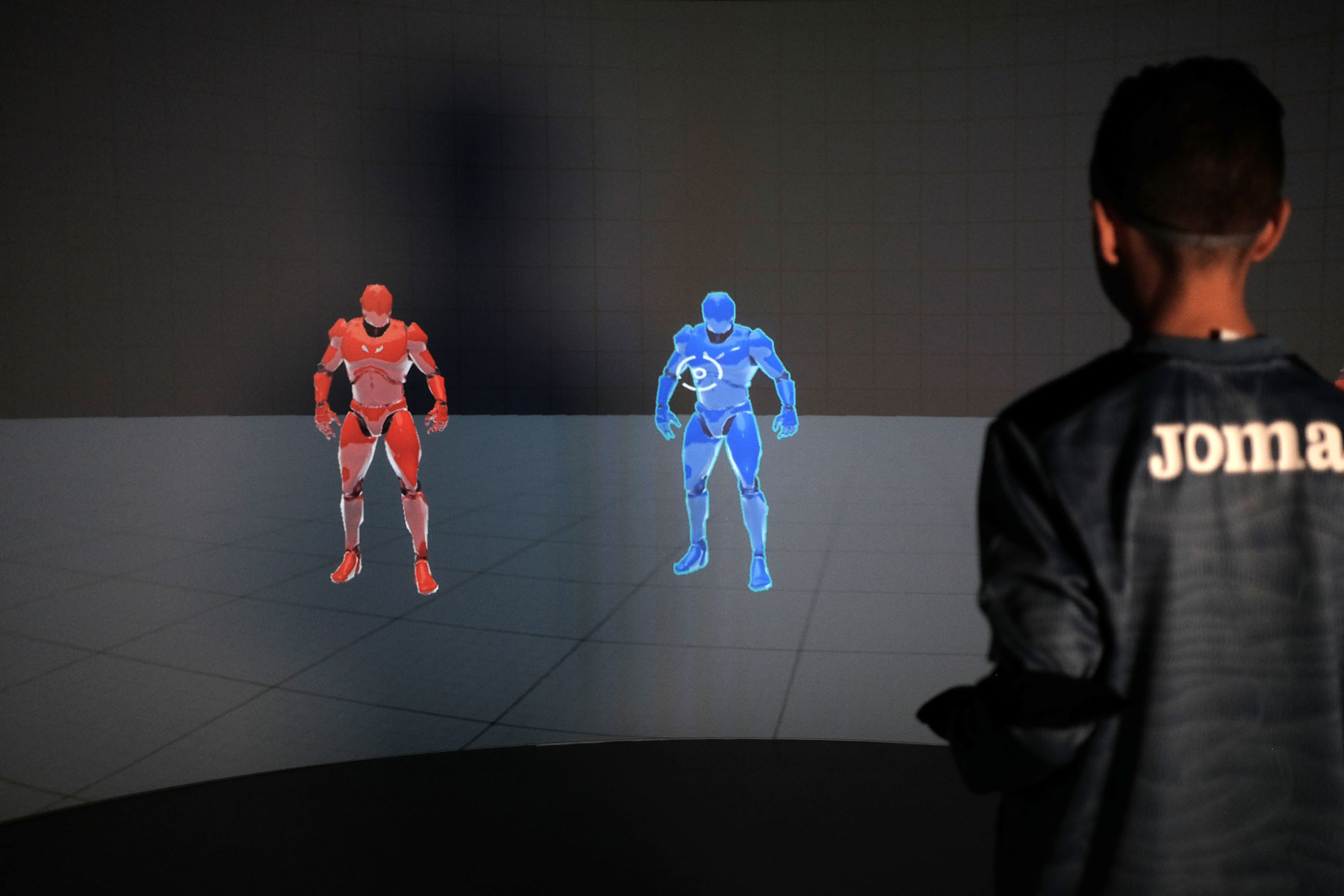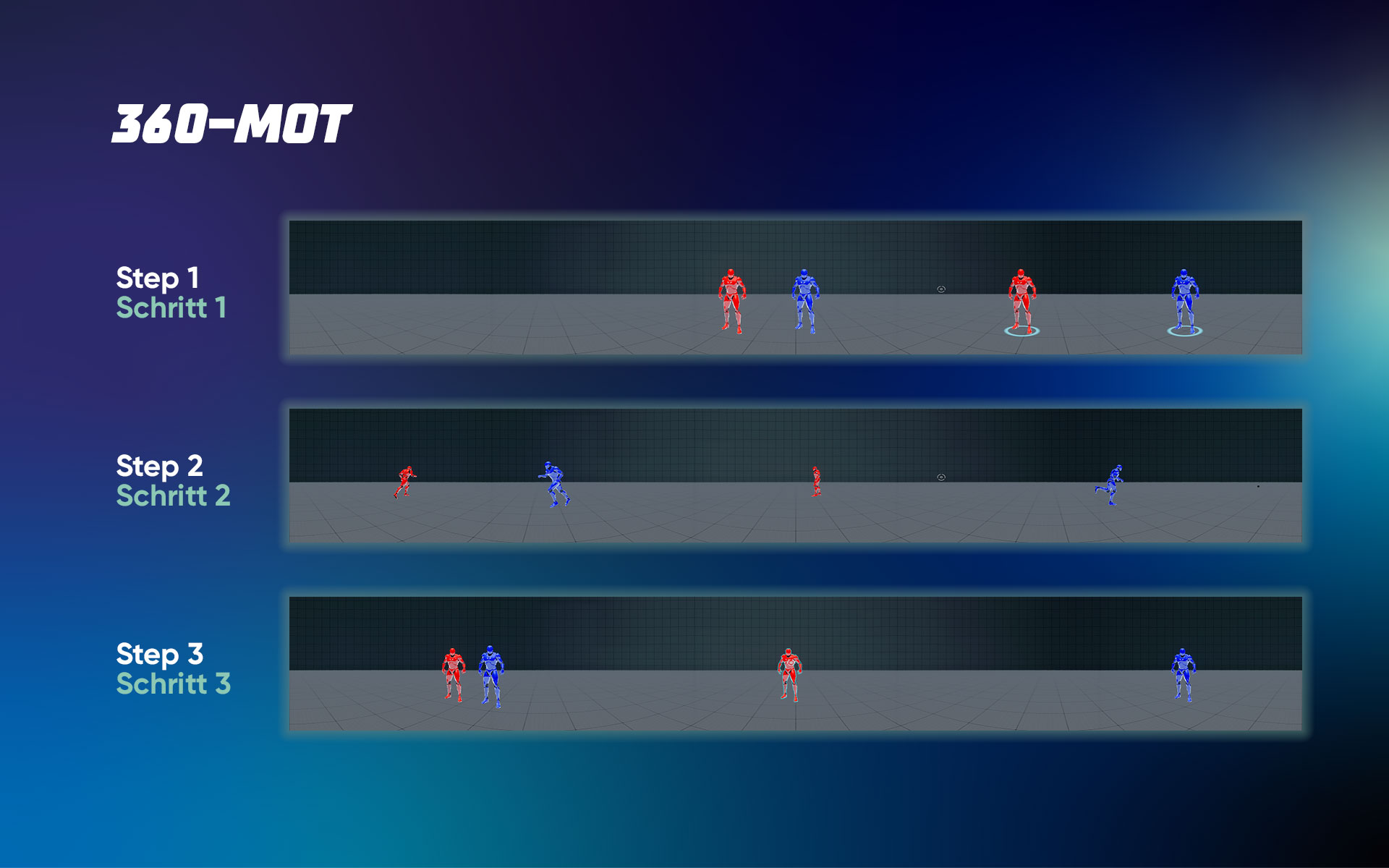
The skills.lab Studio is a fully-immersive new world of cognitive training, offering a unique and gamified training experience to improve an athlete’s situational awareness on the pitch. It has a 360°-curved screen in which athletes interact with easy-to-use handheld controllers to complete interactive exercises.
A study by researchers Ehmann et al(1) from Goethe University Frankfurt, TSG ResearchLab and University of Bern looks at tracking multiple objects in the 360° view area of the skills.lab Studio. As a result, they created a 360° multiple object tracking task that can be reliably used for the assessment of visuospatial cognitive performance.
In team sports like football, teammates and opponents continuously move around the pitch, creating a dynamic and ever-changing environment. The multiple object tracking (MOT) paradigm is an established procedure to visually track a set of moving objects (such as teammates and/or key opponents) among a set of irrelevant objects (such as referees). This simultaneous kind of tracking is established in sports training and diagnostics. However, multiple object tracking problems are frequently presented on a single frontal plane, which is not representative of this 360° angle of the game.
The researchers transferred the multiple object tracking from a front plane view into the 360° environment of the skills.lab Studio (referenced as Helix-Arena in the paper) to better accommodate the environment of team sports athletes. In the authors’ own words:
When making decisions, athletes are subject to the constraints of a complex environment. They must constantly be aware of their surroundings and often base their decisions on information that they have to extract under time pressure from a dynamic 360°-scene. The cognitive procedures used by team athletes should be representative of this complex environment. […]
Compared to classical versions of the task, this approach allows the assessment of cognitive functions in a way that might be closer to the demands of athletic performance in team sports. A more ecologically valid assessment of team sport athletes’ ability to flexibly shift attention and maintain spatial positions in working memory can be achieved within a 360°-environment. In addition, this procedure allows individuals to behave more naturally than is usually the case in cognitive diagnostics.
Our indoor training system skills.lab Studio has the necessary technical features to support multiple object tracking and deliver accurate measurements.

A custom 360° multiple object tracking (360-MOT) task was implemented for the research (see image below):
Step 1: Show which objects to track
A study participant stands in the center of the skills.lab Studio. Three red and three blue objects in human shape are projected into the 360° environment around the user. They are all 4.4 m away from the user’s position. One object of each color gets tagged for 5 seconds – these are the two objects the user has to track.
Step 2: Objects move away and around
When the tag disappears all objects randomly start running through the 3D space (anywhere from 4 m to 53 m projected distance) for 10 seconds.
Step 3: Objects come back
All objects run back to the original distance of 4.4 m to the user’s position, but not at the same positions they started from.
Step 4: Select the correct objects
To complete the task, the user has to select the two objects they were supposed to track by aiming the hand controller at them and triggering a button on it.

The 360-MOT task was repeated 30 times with increasingly faster running speeds (from 13 km/h up to 40 km/h) and different trajectories. A new feature of the skills.lab Studio ensured a proper comparison of the results across the study participants: the randomly generated starting positions and running paths of the objects were stored in advance and shown in the same order.
Nearly half of the participants came back six weeks later for a second round of 360-MOT testing. Their results showed good test-retest reliability and no significant differences of participants’ accuracy across the two dates for the 360-MOT.
In addition to the 360-MOT task, each participant completed a cognitive test battery from the Vienna Test System on a separate computer system: visuospatial attention, visuospatial working memory, and fluid intelligence.
The small but significant correlations with 360-MOT revealed that participants with higher spatial attention and visuospatial working memory capabilities were more adept at tracking the targets in the 360◦-environment. There was no statistically significant correlation between fluid intelligence and 360-MOT. By the researchers’ conclusion, the correlations indicate that the 360-MOT tool in the skills.lab Studio
“can be reliably used for the assessment of visuospatial cognitive performance.”
This builds the foundation for future research on measuring cognitive performance of team sports players, because the researchers established the usefulness and reliability of the 360° multiple object tracking task in the skills.lab Studio.
Stay tuned for a summary of the researchers’ follow-up paper on how cohorts of youth football players, both elite and sub-elite, performed on perceptual-cognitive skills.
In the upcoming weeks and months, our series of blog posts about research related to our skills.lab training systems will continuously grow. Contact us if you have any questions or want to learn more about the skills.lab training systems.
—
(1) Paul Ehmann*†, Adam Beavan*, Jan Spielmann*, Ludwig Ruf*, Jan Mayer*, Sonja Rohrmann†, Christian Nu߆, Chris Englert‡,
360°-multiple object tracking in team sport athletes: Reliability and relationship to visuospatial cognitive functions.
Psychology of Sport and Exercise. Volume 55, 2021.
https://doi.org/10.1016/j.psychsport.2021.101952
Author affiliations:
† Institute of Psychology, Goethe University Frankfurt
* TSG ResearchLab gGmbH
‡ Institute of Educational Science, University of Bern